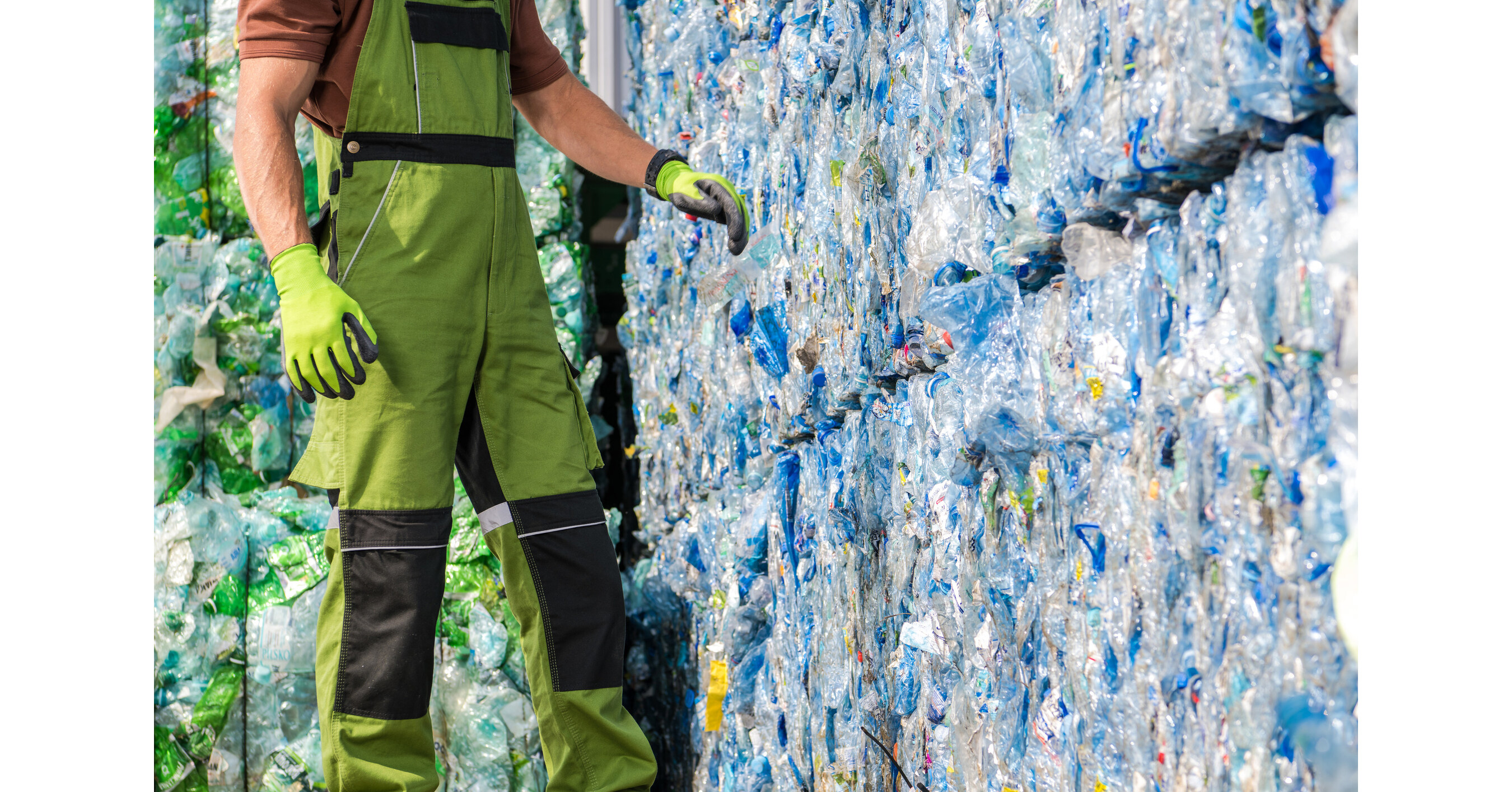Jobs
Study Reveals Plan to Boost U.S. Jobs, Reduce Waste and Cut Emissions for 30% of U.S. Plastic Packaging and Textiles

Blueprint could cut waste by half, reduce greenhouse gas emissions from PET packaging by ~60% and create 46,000 direct U.S. jobs by 2040
LONDON, Nov. 20, 2024 /PRNewswire/ — A new study, published by Systemiq with support from Closed Loop Partners, Eunomia and The Recycling Partnership, outlines a comprehensive roadmap to transition the U.S. PET packaging and polyester textile industries from the current linear single-use model towards circular, low-waste and low-emission systems by 2040.
Titled ‘Transforming PET Packaging and Textiles in the United States’, the study’s launch follows landmark policy announcements, including the recent passage of the Responsible Textile Recovery Act of 2024 in California and the Executive Order on Mobilizing Federal Action on Plastic Pollution. Furthermore, Extended Producer Responsibility (EPR) laws for packaging have been passed in five states (California, Colorado, Maine, Minnesota, Oregon) and are being considered in ten others.
PET packaging and polyester textiles – used in items like beverage bottles, food trays, apparel and carpets – are made from the same molecule (polyethylene terephthalate). U.S. consumers currently use over 100 billion PET bottles and over 10 billion polyester garments each year. These materials constitute 30% of the U.S. plastic packaging and textile consumption. If current trends continue, PET/polyester consumption will grow 1.5 times by 2040, resulting in 13 million metric tons of waste sent to landfill and incineration annually – equivalent to 750,000 garbage trucks. GHG emissions from domestic PET/polyester production would be 2.5 times higher by 2040 than levels needed to meet U.S. emissions reduction targets.
Circular economy approaches offer significant benefits
The study emphasizes the transformative potential of ambitious and complementary circular economy approaches – including reducing avoidable material use, scaling packaging reuse and textiles resale, and expanding recycling, through both mechanical and depolymerization technologies. Depolymerization recycling, an emerging technology that can work alongside established mechanical recycling approaches, offers the opportunity to recycle polyester textiles and harder-to-recycle PET packaging into virgin-quality recycled materials, reducing fossil fuel reliance and cutting emissions.
By 2040 – compared to a continuation of historical trends – applying these proven, complementary measures could result in substantial environmental benefits:
- Increase recycling rates for PET packaging to 70% (up from 23%), and for polyester textiles to 19% (up from 1%).
- Reduce virgin PET/polyester consumption and waste sent to landfill and incineration by half
- Cut projected GHG emissions for packaging by ~60%.
A transformation of the PET packaging and polyester textiles industries could create 46,000 additional direct U.S. jobs and generate $4.9 billion/year in additional revenue for U.S. recycling industries, relative to today.
“A collaborative effort across the value chain is needed to move away from our current take-make-waste system for polyester textiles and PET thermoforms and keep these valuable materials in play––rather than lose them to landfills and incineration,” said Kate Daly, Managing Partner, Closed Loop Partners. “Closed Loop Partners is proud to contribute to this report, which presents a clear opportunity: by adopting established circular economy solutions, we can recover billions in value, reduce waste, lower emissions and create tens of thousands of jobs in the U.S.”
Call for ambitious legislation, industry action and technology scale-up
To fully unlock this transformation, the report calls for swift and bold action from U.S. policymakers and industry leaders.
- Policymakers can take decisive action by implementing well-designed EPR laws. For example, this includes encouraging product design for circularity through eco-modulation of fees, incentivizing U.S. domestic infrastructure, and Bottle Bills where appropriate. Policymakers can also expand collection and sortation capabilities, set mandates to boost demand for post-consumer recycled content (rPET), and de-risk private sector investments.
- Industry leaders can accelerate the transformation by reducing unnecessary consumption of packaging and textiles, designing products for reuse and recycling, scaling textiles collection, and increasing the use of domestically sourced rPET.
- The study further emphasizes the need for collaboration between government, industry and investors to create the enabling environment, investment flows and industry adoption required to deploy new and proven technologies, such as Artificial Intelligence-based waste sortation and depolymerization recycling, at scale.
“The U.S. packaging and textile sectors have a real opportunity to lead the way in circular innovation,” said Brad Lich, Eastman Executive Vice President and Chief Commercial Officer. “Eastman believes that scaling new and proven technologies like depolymerization alongside mechanical recycling and complementary circular economy approaches like reuse/refill, will reduce our dependence on fossil fuels, create jobs, and significantly cut emissions.”
“For the U.S. to fully realize the potential of a circular economy for PET and polyester, it’s vital for state and federal policymakers to implement ambitious legislation including well-designed EPR,” said Kate Davenport, Chief Policy Officer at The Recycling Partnership. “Strong public-private partnerships and clear regulatory frameworks are essential to deliver the infrastructure, attract targeted investment and scale the change required to build a better recycling system.”
‘Transforming PET Packaging and Textiles in the United States’ was developed under the guidance and governance of an independent Steering Group comprising 15+ representatives from industry, waste management and recycling, academia and civil society. The study was commissioned / funded by Eastman, who had one seat on the Steering Group.
The full study is available for download at https://systemiq.info/pet-polyester-us.
Media Contact
Jacob Teetzmann, APR
[email protected]
About this study
‘Transforming PET Packaging and Textiles in the United States: Systems Change Scenarios and Recommendations to Cut Waste, Create Jobs, and Mitigate Climate Change’ assesses the current state of PET packaging and polyester textiles circularity in the U.S., uses detailed system modelling to quantify the impact of applying proven circular approaches (reduce, reuse, recycling) under different scenarios, and outlines recommendations for government and the private sector to achieve the benefits of an ambitious scenario. The study was published by Systemiq with support from Closed Loop Partners, Eunomia and The Recycling Partnership, and commissioned and financed by Eastman. https://systemiq.info/pet-polyester-us
About Systemiq
Systemiq was founded in 2016 to drive the achievement of the Paris Agreement and the UN Sustainable Development Goals by transforming markets and business models in five key systems: nature and food, materials and circularity, energy, urban areas and sustainable finance. A certified B-Corp, Systemiq combines strategic advisory with high-impact on-the-ground work, and partners with business, finance, policy makers and civil society to deliver systems change. Systemiq has offices in Brazil, France, Germany, Indonesia, the Netherlands and the UK. Find out more at www.systemiq.earth.
About Closed Loop Partners
Closed Loop Partners is at the forefront of building the circular economy. The firm is comprised of three businesses that create a platform for systems change: an investment division, Closed Loop Capital Management; an innovation center, the Center for the Circular Economy; and an operating group, Closed Loop Builders. Across our businesses, we innovate, invest and build to optimize supply chains, advance natural resource efficiency and drive economic value.
About Eunomia Research and Consulting
Eunomia is a global environmental consultancy with nearly 25 years of expertise, delivering science-based research and advisory services that challenge the status quo. Their work spans the circular economy, including sustainable material use and reuse, recycling, and waste management; carbon economy, including measuring and reducing carbon footprints, navigating offsets, and aligning with global standards; and natural economy, including enhancing ecological balance and developing nature-based investments. Eunomia provides innovative, unbiased solutions across policy, strategy and implementation for a sustainable future. Learn more at www.eunomia.eco
About The Recycling Partnership
The Recycling Partnership is a purpose-driven organization committed to building a better recycling system, one that delivers the economic and environmental benefits our communities and the hundreds of thousands of people who work throughout the recycling industry deserve. The Recycling Partnership’s team of experts, practitioners, and thought leaders with real-world experience works with its partners to insist on meaningful change across the recycling system and assist communities, companies, and policymakers in enacting such change. The Recycling Partnership uses its one-of-a-kind National Recycling Database that encompasses more than 9,000 U.S. recycling programs and develops practical and innovative solutions to address critical gaps in the recycling system. Learn more at recyclingpartnership.org.
SOURCE Systemiq
WANT YOUR COMPANY’S NEWS FEATURED ON PRNEWSWIRE.COM?
440k+
Newsrooms &
Influencers
9k+
Digital Media
Outlets
270k+
Journalists
Opted In










